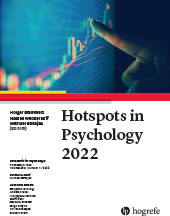Call for Papers: “Are All Conspiracy Theories Created Equal? The Form, Functions, and Consequences of General Conspiracy Mindsets Versus Specific Beliefs”
A Topical Issue of the Zeitschrift für Psychologie
Focus of the Topical Issue, Aims, and Scope
Events like the 2021 storming of the US capitol or protests against protective measures during the global COVID-19 pandemic have brought conspiracy beliefs and their consequences to the center stage of political discourse. Although each of these actions is motivated by very concrete conspiracy allegations, psychological research has long suspected a coherent mindset behind concrete conspiracy beliefs, labelled a conspiracy mentality, conspiracist ideation, conspiratorial worldview or mindset. In this special issue we welcome submissions that help elucidate the psychology behind this general propensity to endorse conspiracy theories as well as scholarly critique and empirical arguments against this view. We invite original scholarly contributions that aim to tackle the different functions and manifestations of different conspiracy beliefs as well as a generalized conspiracy mentality.
Both original papers as well as systematic reviews and meta-analyses are welcome in this special issue. Studies spanning across longer periods of time and wider geographical regions, would be of special interest to editors. In particular, the editors may prioritize longitudinal over cross-sectional data, experimental over correlational evidence, data from underrepresented samples over convenience or crowdsourced samples, or pre-registered research over non-pre-registered research.
The topics covered may include (but are not limited to):
- •What are different antecedents and consequences of generalized conspiracy mentality vs. specific conspiracy beliefs?
- •To what extent are conspiracy beliefs just an expression of an underlying worldview or highly specific beliefs that serve intergroup as well as personal purposes?
- •What is conspiracy mentality and what are the (dis)similarities with political ideology?
- •As a counterpoint to the notion of a uniform worldview: Are there meaningful differences between different conspiracy beliefs that are associated with differential antecedents, functions, and consequences (e.g., intergroup vs. intragroup; personally affected vs. not; targeting elites vs. marginalized groups)?
- •How does the concept of a uniform mentality help or hinder interventions aimed at mitigating the potential adverse effects of conspiracy beliefs?
How to Submit
There is a two-stage submission process. Initially, interested authors are requested to submit extended abstracts of their proposed papers. Authors of the selected abstracts will then be invited to submit full papers. All manuscripts will undergo blind peer review.
Stage 1: Structured Abstract Submission
Authors interested in this special issue must submit a structured abstract of the planned manuscript before submitting a full paper. The goal is to provide authors with prompt feedback regarding the suitability and relevance of the planned manuscript to the special issue.
The deadline for submitting structured abstracts is June 15, 2022.
Feedback on whether or not the editors encourage authors to submit a full paper will be given by August 1, 2022.
Structured abstracts should be within 500 to 1,000 words maximum and may encompass information on each of the following headings: (a) Background and Objectives, (b) Methods, (c) Results, (d) Conclusions. For empirical papers, please specify whether the study was pre-registered or not.
Structured abstracts should be submitted by email to the guest editor Roland Imhoff (roland.
Stage 2: Full Paper Submission
For those who have been encouraged to submit a full paper, the deadline for submission of manuscripts is January 1, 2023.
The full papers must be submitted through the online submission system of the journal, Editorial Manager. Full manuscripts will undergo a blind peer-review process.
Submission Guidelines for Full Papers
- •Only English-language submissions can be considered.
- •Contributions must be original (not published previously or currently under review for publication elsewhere).
- •Review and original articles should not exceed 45,000 characters and spaces in length (roughly 6,500 words), including references, figures, and tables (allowances for figures and tables should be deducted on the basis of size: approximately 1,250 characters for a quarter-page figure/table).
- •All research syntheses should adhere to the meta-analytic reporting standards (MARS) proposed by the APA (http://www.apa.org/pubs/authors/jars.pdf). Additionally, authors should include a statement in accordance with the Preferred Reporting Items for Systematic Reviews and Meta-Analyses (PRISMA) statement (most current version available at http://www.prisma-statement.org) as a supplemental file for review.
- •Other submission formats (short reports, opinion pieces, etc.) will also be considered – please contact the editors for details. Research spotlights reporting single studies will be reserved for studies including hard-to-reach-populations, advanced methods, exceptionally large datasets, or any other feature that justifies the single study format.
- •Reference citations in the text and in the reference list should be in accordance with the principles set out in the Publication Manual of the American Psychological Association (7th ed.).
- •Supplementary material must be made available through PsychArchives: https://www.psycharchives.org/
- •For exemplary articles, please see any recent issue of the journal.
For more detailed instructions for authors, please visit the following link https://tinyurl.com/2mbzfjth.
Timeline
- •June 15, 2022: Abstract submissions due
- •August 1, 2022: Deadline for abstract selection/call for full papers
- •January 1, 2023: Full paper submissions due
- •March 15, 2023: Guest editor feedback to authors
- •June 1, 2023: Deadline for revised papers
- •September 30, 2023: Guest editor feedback to revised papers
- •Issue 1 (2024): Publication topical issue
About the Journal
The Zeitschrift für Psychologie, founded in 1890, is the oldest psychology journal in Europe and the second oldest in the world. One of the founding editors was Hermann Ebbinghaus. Since 2007 it is published in English and devoted to publishing topical issues that provide state-of-the-art reviews of current research in psychology. For more detailed information about the journal please visit the official website at http://www.hgf.io/zfp.



